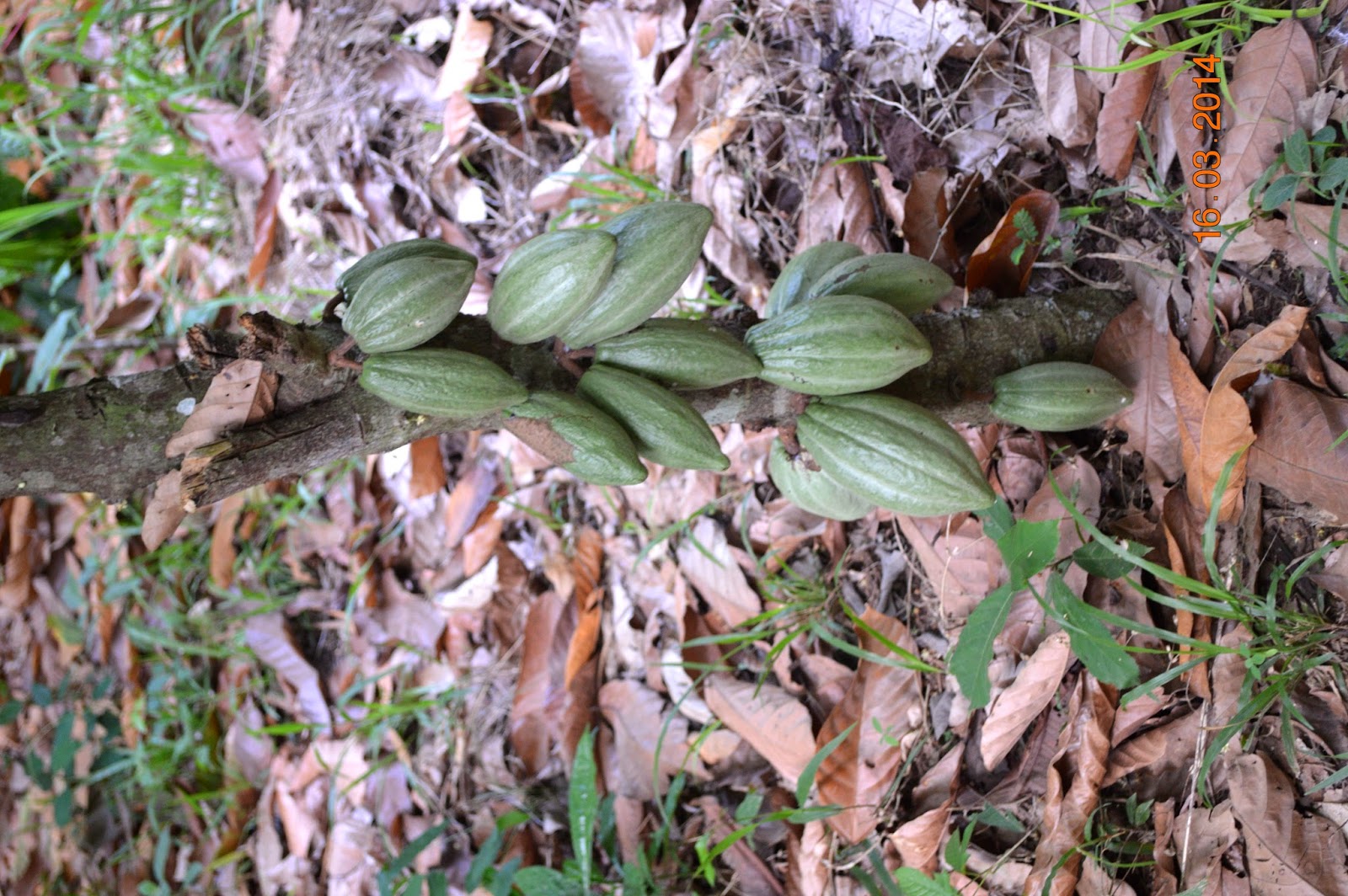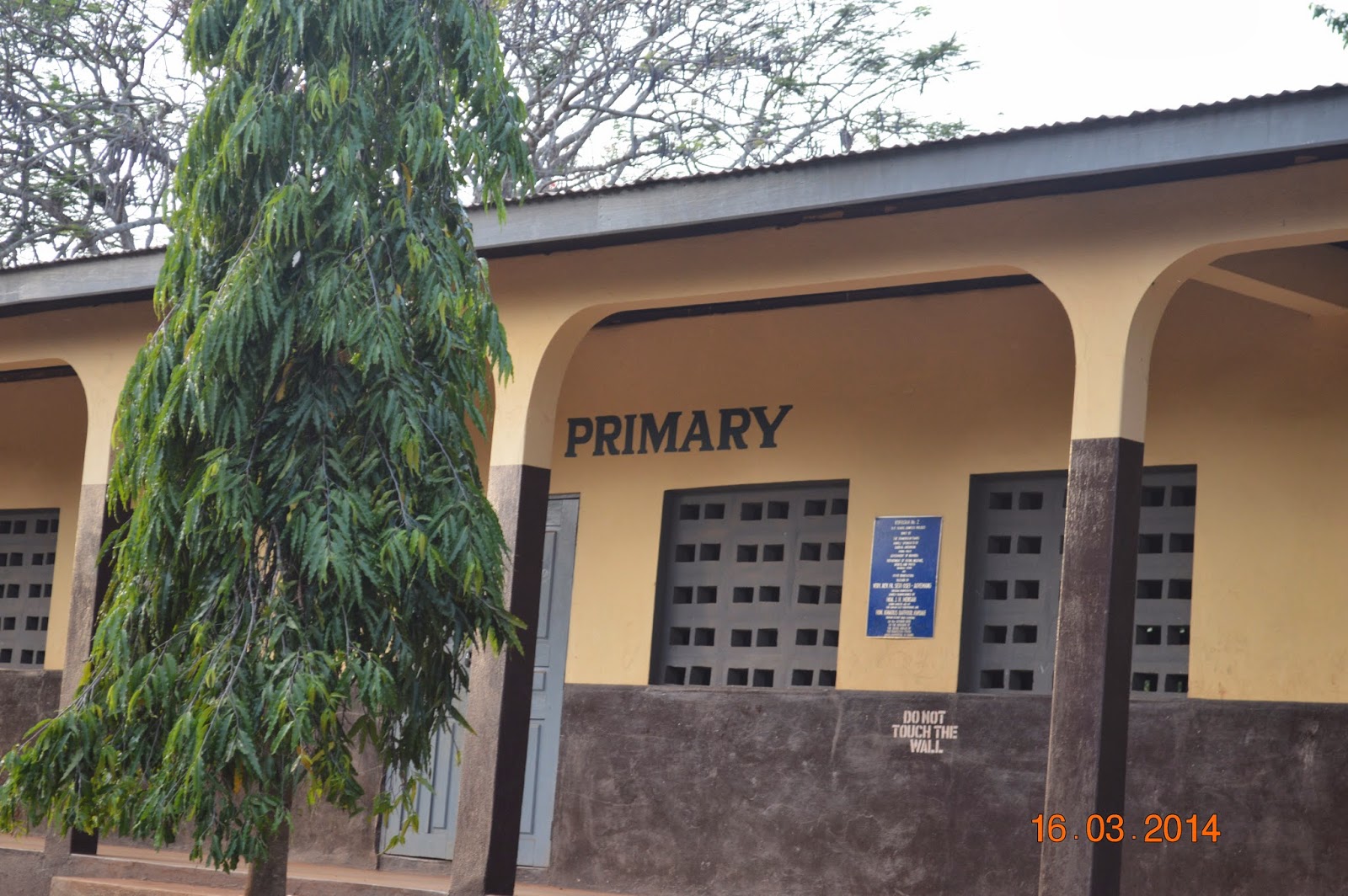 |
| Well in the center of the village where Kwame spent much of his childhood |
When traveling Ghana one is forced to see how life is for
the majority of people in the country, sugarcoating the experience is really
not an option because poverty is visible everywhere. So, I am going to use my exchange partner’s
life story to start delving into the topic of development.
Please know upfront--the
Ghanaian people are the nicest, most gracious people I have ever encountered.
Their big smiles make the world richer, their knack for making do with very little is remarkable, their sense of presenting themselves as clean and well-dressed people is impressive. They have a very strong sense of community which translates down into every village--it was clear for us to see that the kids could roam free and that they were safe because there isn't much danger in villages. They also had an innocent happiness about them which might stem from them not being exposed to TV. Of course, they'd also have to do their chores. Overall, the warmth that we got to experience through our Ghanaian exchange partners and through them also that of other people might be something we want to work on.
My exchange partner Nana Kwame Baah-Korang is the fourth of
five children born to illiterate
parents; he has two older sisters and an older brother as well as a younger
sister. His father spent five years in
India during WWII as a soldier in the British army but then returned to tend to
his farm in the interior of the country. They planted predominantly cassava and
plantains.
The well depicted in the photo above did not exist in Kwame's childhood but the village the center of which is taken up by the well was Kwame's village and the closest to a 'downtown' people here experienced. There is no electricity and no running water...and it is only 8 km (roughly 5 miles) away from the town Sunyani where such luxuries exist--not for everyone, though.
Kwame’s farm is located a relatively short walk from the
village, see picture below. He has workers who run the farm. The farms are located within the plot of land and are thus rather isolated.
 |
| Nana Kwame's farm |
The farmhouse, living areas and sheds are arranged so that there is a square in the center where much of the daily activities occur; particularly the pounding of fufu (cassava, plantain and water), the pounding of palm kernels to make palm oil (see photo below) and the wash. The shed to the right contains goats.
 |
| Pounding palm nuts to make oil |
Palm nuts look like this:
and come unsurprisingly from palm trees.
The dry fiber remnants of the material that was pounded to make the palm oil is often returned to the tree to dry. It will be used to start the fire for cooking.
In addition to palm oil, palm fonds (= the leaves) are used for thatched roofing for more traditional houses which was definitely part of Kwame's childhood cottage as well as brooms.
Kwame primarily plants cocoa trees the product of which he sells on the market. The photo below shows a view into the cocoa grove to the right of the path.
Below you can see how cocoa grows on a tree, an below that one you see a ripe one ready to harvest.
 |
| View onto the cocoa grove--Kwame owns eight acres |
 |
| Sorry, flip the photo to the right please. The cocoa nuts are hanging down from the tree trunk. |
 |
| Kwame showcasing a ripe cocoa nut. |
Sorry, I forgot to take a photo of the interior of the nut because while I started to do so, ants from a branch above had discovered me somehow and I was a crawling mess being slapped to death by all kinds of kind hands.
On the way between Kwame's
farm and that of his brother we find this elementary school and apparently not
much has changed. This was the primary school where Kwame went to school 54
years ago.
There is no electricity and no running water—the schoolrooms do have a chalkboard each. The windows are open so that a welcome breeze will be able to get in. Adequate actually. Teachers nowadays have their own quarters close by so that they don’t have to travel at all.
 Kwame explained that he got up every morning at three o’clock
to do farm chores and to find time to study. His consistent studying eventually
earned him scholarships to go to the nearby town Sunyani to attend high school.
He lived in town with clan members because the walk to the village and farm
would have taken hours. Eventually he graduated from high school and won more
scholarships to go to the university where he read mathematics, as the British put it (the schooling system is based on the British as this is their former colony). Eventually he
earned a master’s degree in mathematics and returned to Sunyani to become a
high school teacher. Nine years later
there was an opening as mathematician at the Polytechnic College in the city,
he applied and got the job.
Kwame explained that he got up every morning at three o’clock
to do farm chores and to find time to study. His consistent studying eventually
earned him scholarships to go to the nearby town Sunyani to attend high school.
He lived in town with clan members because the walk to the village and farm
would have taken hours. Eventually he graduated from high school and won more
scholarships to go to the university where he read mathematics, as the British put it (the schooling system is based on the British as this is their former colony). Eventually he
earned a master’s degree in mathematics and returned to Sunyani to become a
high school teacher. Nine years later
there was an opening as mathematician at the Polytechnic College in the city,
he applied and got the job.
We ended our tour of Kwame's farm with a visit to his brother's farm. We received a gracious welcome and we got to see how different the worlds can be between brothers. Below Nana Kwame is to the right, his brother to the left. In the background is Kwame's wife.
Within his community Kwame has taken on the position of elected chief and also advisor to the paramount Chief, the latter representing the highest position within the Akan Chieftaincy. This is a political/social structure that coexist with the democratic structure of the country--however, should the government make decisions that are not welcomed by the paramount Chief, the government might find itself at a loss at what to do. More on this topic tomorrow.
Suffice it to conclude that Nana Baah Korang gives back to the community with dedicated work in the traditional chieftaincy system, with committee work in his church (he is one of the elders there) and by raising one of his brother's sons because he hoped he would do better in school under his supervision than in the village, a hope that so far has not been fulfilled.
There is no electricity and no running water—the schoolrooms do have a chalkboard each. The windows are open so that a welcome breeze will be able to get in. Adequate actually. Teachers nowadays have their own quarters close by so that they don’t have to travel at all.
To get back to Nana Kwame:
Only three of the five
children of Kwame’s immediate family finished elementary school and only one
went on to secondary school and then on to university on government
scholarships. This was Nana Kwame.
 Kwame explained that he got up every morning at three o’clock
to do farm chores and to find time to study. His consistent studying eventually
earned him scholarships to go to the nearby town Sunyani to attend high school.
He lived in town with clan members because the walk to the village and farm
would have taken hours. Eventually he graduated from high school and won more
scholarships to go to the university where he read mathematics, as the British put it (the schooling system is based on the British as this is their former colony). Eventually he
earned a master’s degree in mathematics and returned to Sunyani to become a
high school teacher. Nine years later
there was an opening as mathematician at the Polytechnic College in the city,
he applied and got the job.
Kwame explained that he got up every morning at three o’clock
to do farm chores and to find time to study. His consistent studying eventually
earned him scholarships to go to the nearby town Sunyani to attend high school.
He lived in town with clan members because the walk to the village and farm
would have taken hours. Eventually he graduated from high school and won more
scholarships to go to the university where he read mathematics, as the British put it (the schooling system is based on the British as this is their former colony). Eventually he
earned a master’s degree in mathematics and returned to Sunyani to become a
high school teacher. Nine years later
there was an opening as mathematician at the Polytechnic College in the city,
he applied and got the job.
Kwame still gets up as early as three in the morning, to
read and grade. On a normal day he goes to bed at 7 pm this is pretty much when
it is dark.
We ended our tour of Kwame's farm with a visit to his brother's farm. We received a gracious welcome and we got to see how different the worlds can be between brothers. Below Nana Kwame is to the right, his brother to the left. In the background is Kwame's wife.
Within his community Kwame has taken on the position of elected chief and also advisor to the paramount Chief, the latter representing the highest position within the Akan Chieftaincy. This is a political/social structure that coexist with the democratic structure of the country--however, should the government make decisions that are not welcomed by the paramount Chief, the government might find itself at a loss at what to do. More on this topic tomorrow.
Suffice it to conclude that Nana Baah Korang gives back to the community with dedicated work in the traditional chieftaincy system, with committee work in his church (he is one of the elders there) and by raising one of his brother's sons because he hoped he would do better in school under his supervision than in the village, a hope that so far has not been fulfilled.







No comments:
Post a Comment